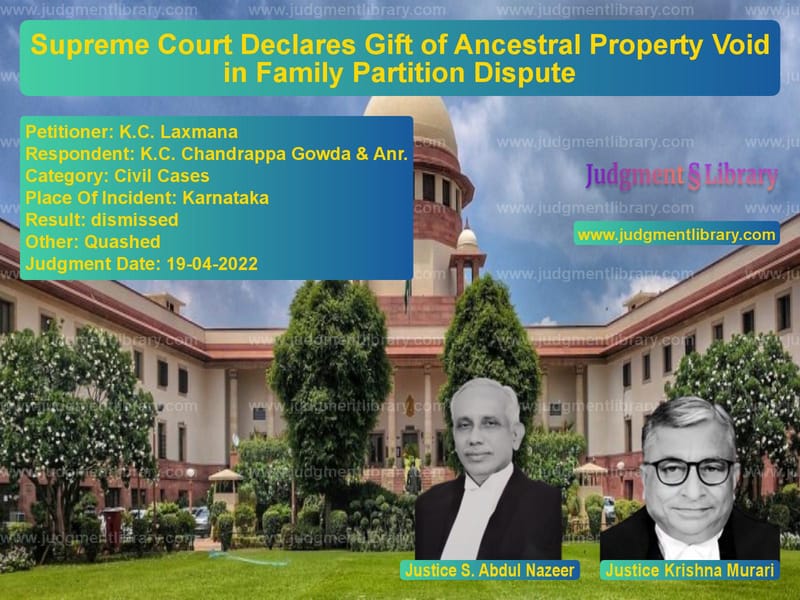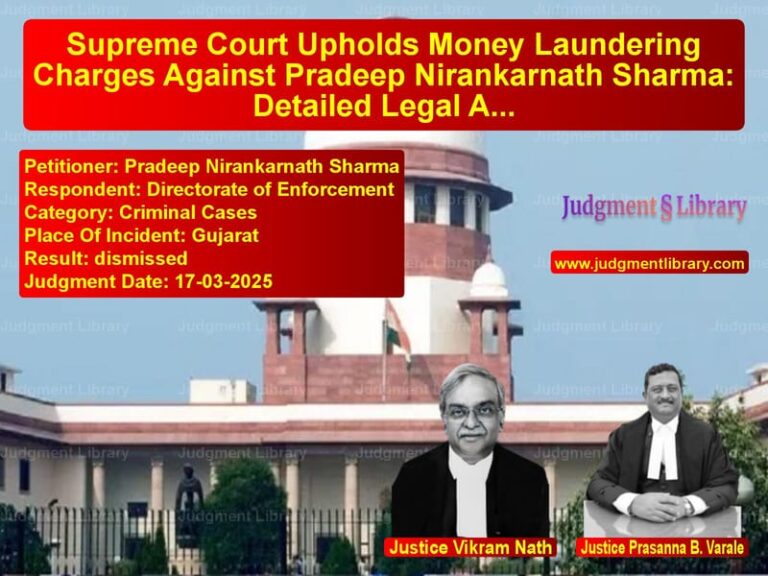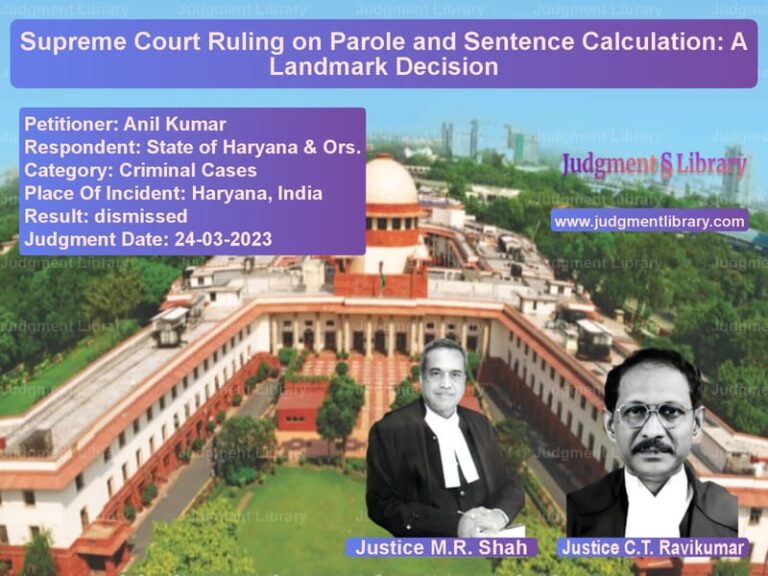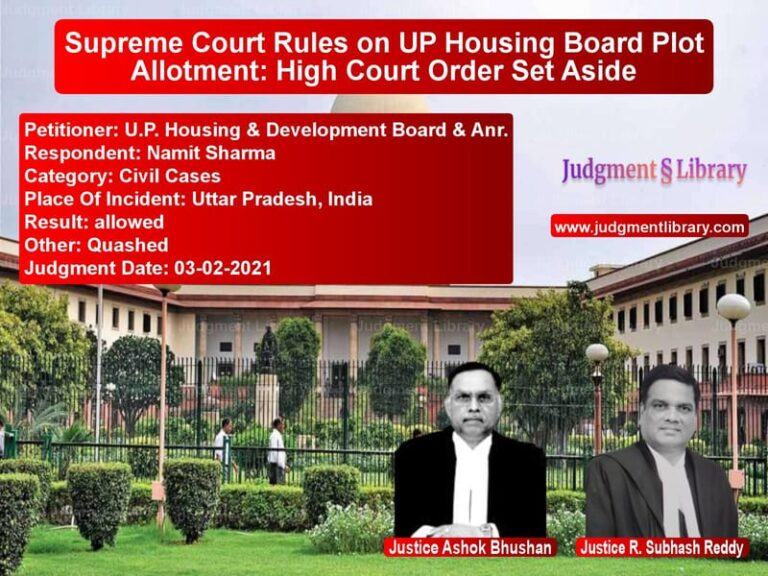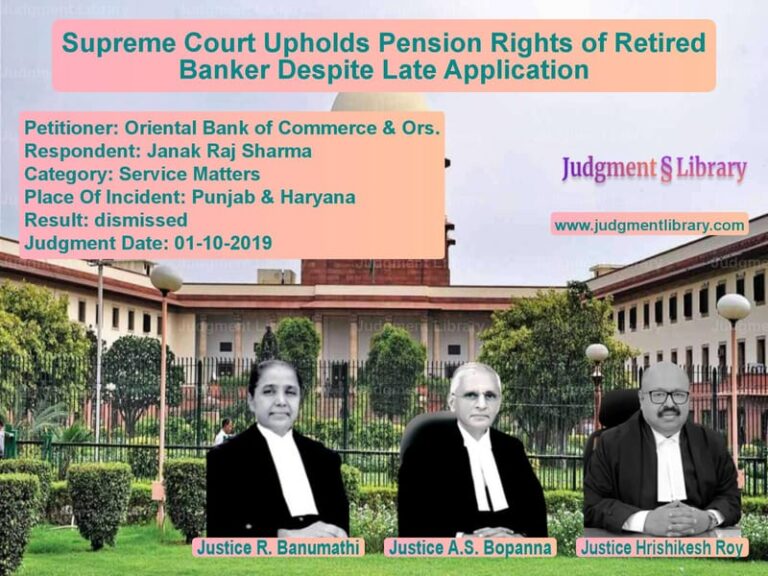Supreme Court Declares Gift of Ancestral Property Void in Family Partition Dispute
The Supreme Court of India recently delivered a judgment in K.C. Laxmana vs. K.C. Chandrappa Gowda & Anr., which dealt with a dispute over the gifting of ancestral property by a Hindu father to a non-coparcener. The ruling established critical principles regarding the rights of coparceners and the limitations of a father’s power to alienate joint family property.
Background of the Case
The dispute arose between the appellant, K.C. Laxmana, and the respondent, K.C. Chandrappa Gowda, concerning a piece of ancestral property. The respondent filed a suit against his father, K.S. Chinne Gowda, and the appellant, challenging the transfer of joint family property through a gift/settlement deed dated 22.03.1980. The respondent sought partition and separate possession of his one-third share in the suit property.
The plaintiff contended that the schedule property belonged to their Hindu Undivided Family (HUF), which comprised himself, his father (the first defendant), and another coparcener, K.C. Subraya Gowda. He argued that since the property was ancestral, his father had no legal authority to gift or alienate it in favor of the second defendant (appellant), who was not a coparcener.
Legal Issues
- Whether the suit was barred by limitation.
- Whether the father had the authority to gift joint family property to a non-coparcener.
- Whether the alienation was legally valid under Hindu law.
- Whether the gift constituted a transfer for a pious purpose.
Arguments by the Parties
Appellant’s Arguments
- The appellant argued that the suit was barred by limitation under Article 58 of the Limitation Act, 1963, which prescribes a three-year period for filing a suit for declaration.
- He contended that the transfer of property was made out of love and affection, which should be considered a valid reason for alienation.
- The appellant also claimed that since the father was the Karta (head) of the joint family, he had the authority to make such a transfer.
Respondent’s Arguments
- The respondent argued that the suit was governed by Article 109 of the Limitation Act, which allows twelve years to challenge the alienation of ancestral property.
- He emphasized that the transfer of joint family property was void because it was made without the consent of all coparceners.
- He relied on precedents stating that gifts of ancestral property by the Karta of a Hindu joint family are permissible only for charitable or religious purposes.
Supreme Court’s Judgment
Key Observations
- The Court noted that under Hindu law, a Karta can alienate joint family property only for legal necessity, benefit of the estate, or with the consent of all coparceners.
- The Court held that a gift made out of love and affection does not qualify as a “pious purpose” under Hindu law.
- The settlement deed was declared void because it was executed without the consent of all coparceners.
- Regarding the limitation period, the Court ruled that Article 109 of the Limitation Act applied, and the suit was filed within the permissible period of twelve years from the date the alienee took possession.
Final Decision
The Supreme Court dismissed the appeal and upheld the decision of the High Court of Karnataka, declaring the gift deed null and void. The Court observed:
“A Hindu father or any other managing member has the power to make a gift within reasonable limits of ancestral immovable property only for pious purposes. A gift made out of love and affection does not qualify as a pious purpose under Hindu law.”
Implications of the Judgment
For Hindu Joint Family Law
- The judgment reinforces that the Karta cannot unilaterally alienate joint family property unless it meets specific legal conditions.
- Transfers of ancestral property must have the consent of all coparceners unless they are for legal necessity.
For Property Rights
- The ruling protects the interests of coparceners by ensuring that they have a say in the alienation of joint family property.
- It provides clarity on the applicability of limitation laws in property disputes.
For Future Legal Precedents
- The judgment aligns with earlier decisions that restrict the powers of the Karta in transferring ancestral property.
- It sets a precedent for similar cases where family property is gifted without due legal backing.
Conclusion
The Supreme Court’s decision in K.C. Laxmana vs. K.C. Chandrappa Gowda & Anr. reaffirms the principle that ancestral property cannot be gifted by the Karta unless it serves a pious purpose or is made with the consent of all coparceners. By declaring the gift deed void, the Court protected the integrity of Hindu joint family law and ensured that property rights remain safeguarded for future generations.
Petitioner Name: K.C. Laxmana.Respondent Name: K.C. Chandrappa Gowda & Anr..Judgment By: Justice S. Abdul Nazeer, Justice Krishna Murari.Place Of Incident: Karnataka.Judgment Date: 19-04-2022.
Don’t miss out on the full details! Download the complete judgment in PDF format below and gain valuable insights instantly!
Download Judgment: k.c.-laxmana-vs-k.c.-chandrappa-gowd-supreme-court-of-india-judgment-dated-19-04-2022.pdf
Directly Download Judgment: Directly download this Judgment
See all petitions in Property Disputes
See all petitions in Succession and Wills
See all petitions in Landlord-Tenant Disputes
See all petitions in Judgment by S. Abdul Nazeer
See all petitions in Judgment by Krishna Murari
See all petitions in dismissed
See all petitions in Quashed
See all petitions in supreme court of India judgments April 2022
See all petitions in 2022 judgments
See all posts in Civil Cases Category
See all allowed petitions in Civil Cases Category
See all Dismissed petitions in Civil Cases Category
See all partially allowed petitions in Civil Cases Category

